【2022中考英语一轮教材专题复习】外研八年级下册 Modules 4-5课件(共71张PPT)
文档属性
| 名称 | 【2022中考英语一轮教材专题复习】外研八年级下册 Modules 4-5课件(共71张PPT) |
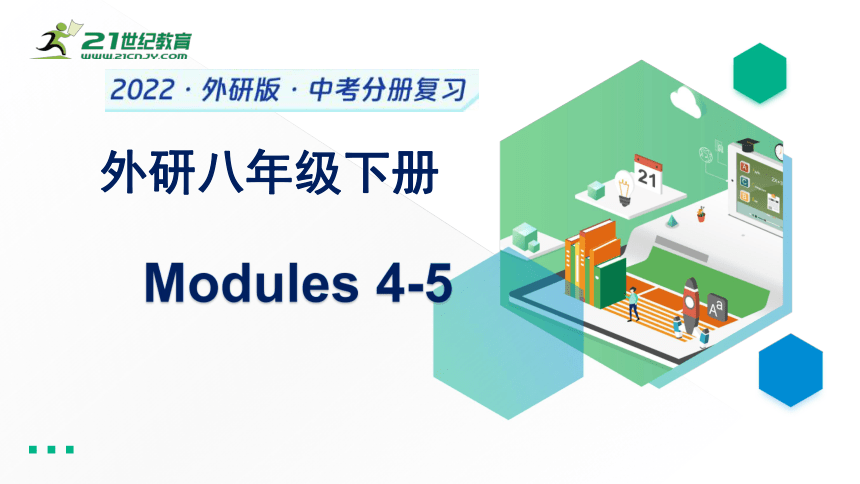
|
|
| 格式 | pptx | ||
| 文件大小 | 3.4MB | ||
| 资源类型 | 试卷 | ||
| 版本资源 | 外研版 | ||
| 科目 | 英语 | ||
| 更新时间 | 2022-02-11 00:00:00 | ||
图片预览

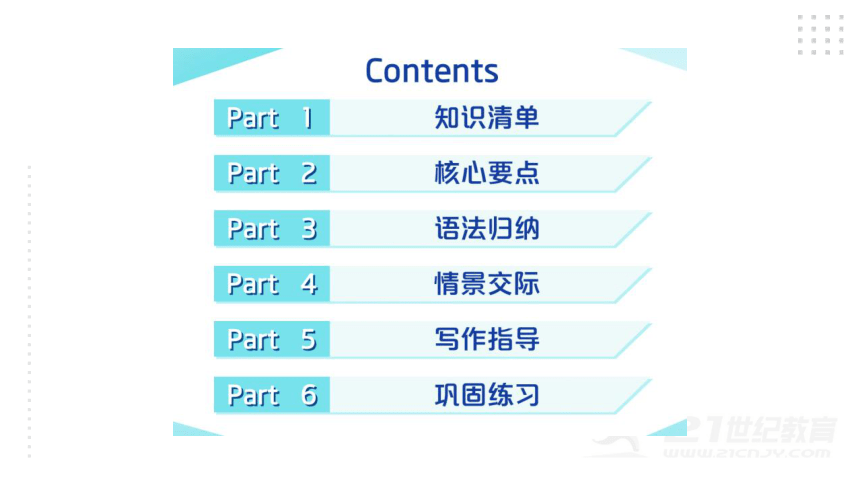
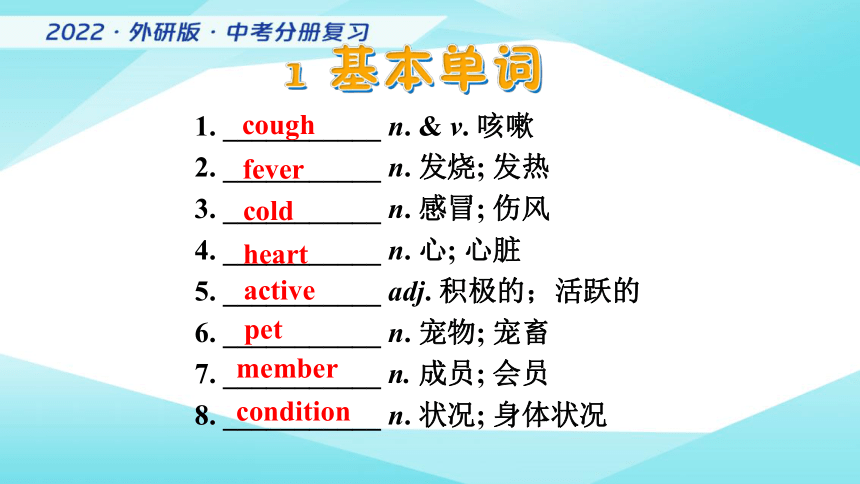
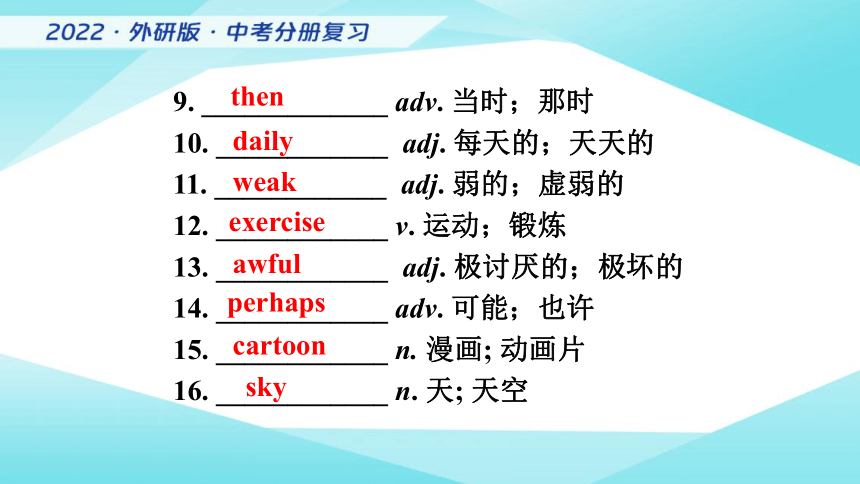
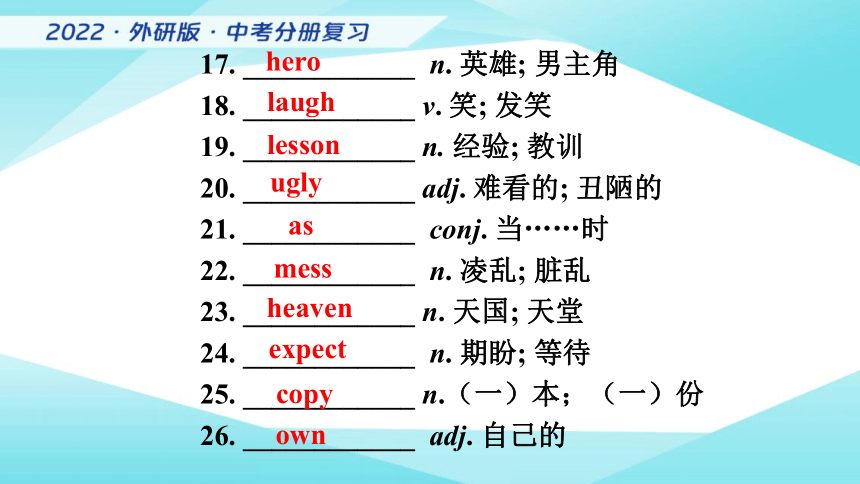
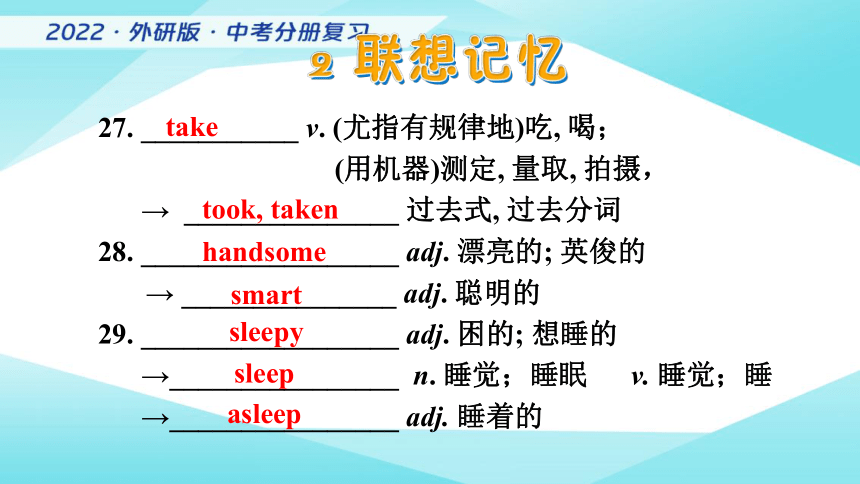
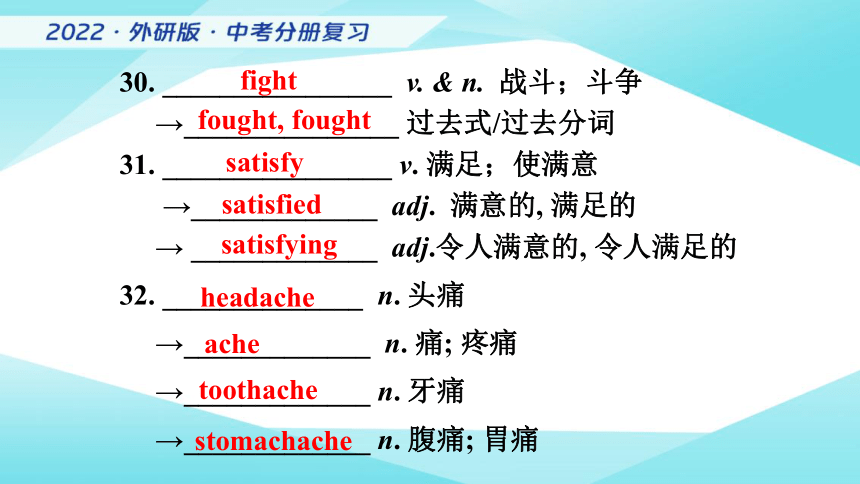
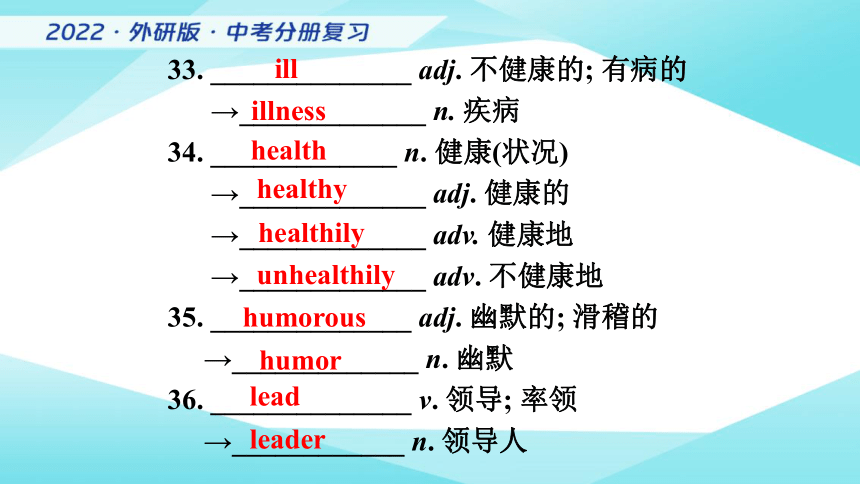
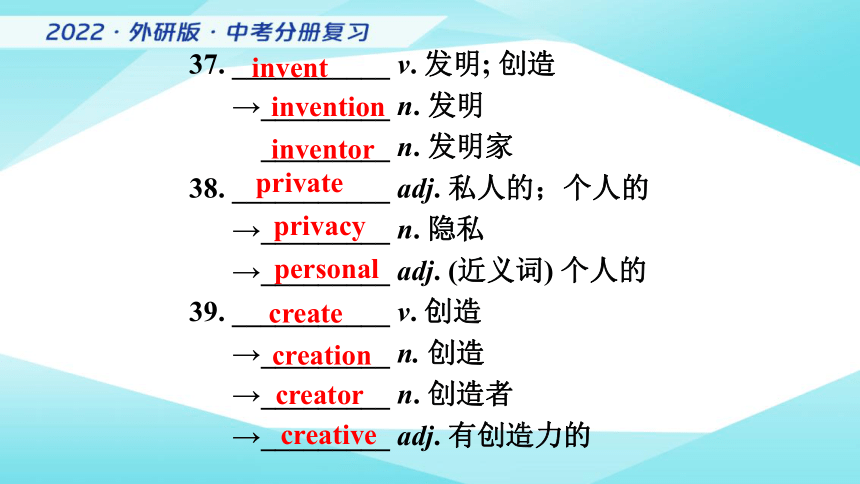
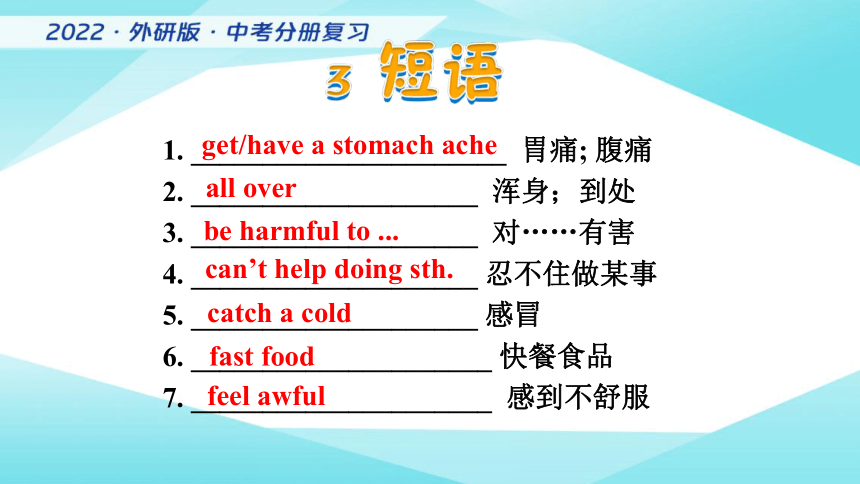
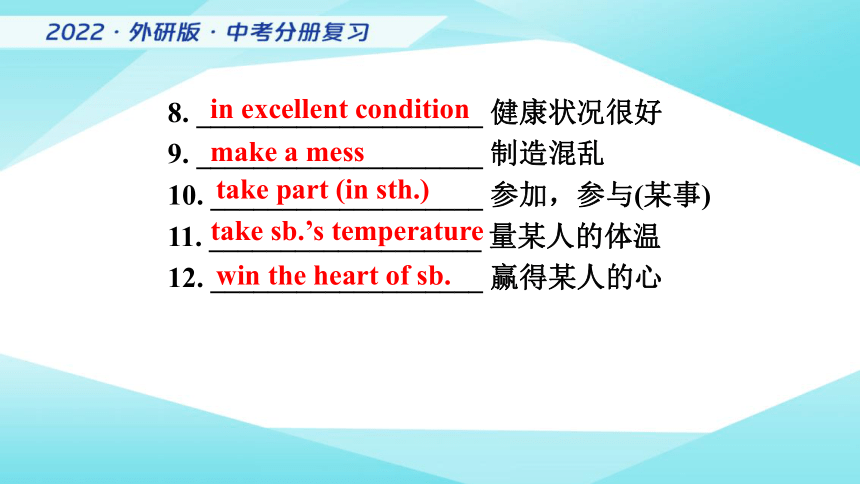
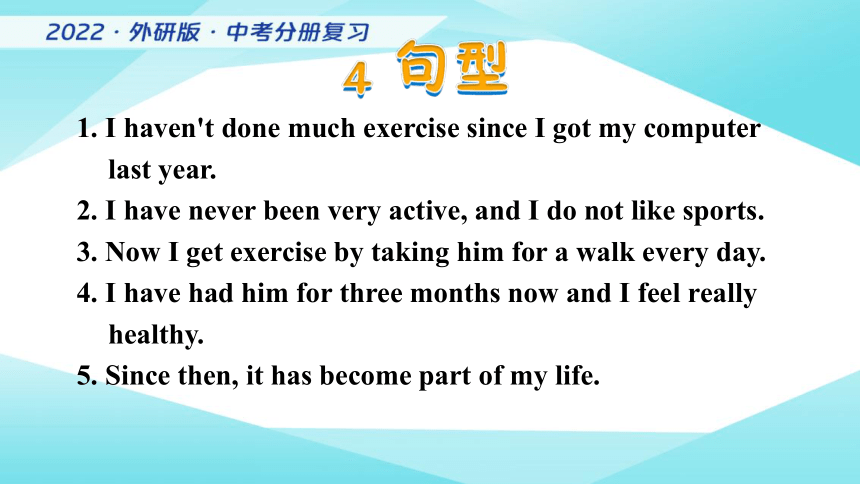
文档简介
(共71张PPT)
外研八年级下册
Modules 4-5
Presentation
1. ___________ n. & v. 咳嗽
2. ___________ n. 发烧; 发热
3. ___________ n. 感冒; 伤风
4. ___________ n. 心; 心脏
5. ___________ adj. 积极的;活跃的
6. ___________ n. 宠物; 宠畜
7. ___________ n. 成员; 会员
8. ___________ n. 状况; 身体状况
cough
fever
cold
heart
active
pet
member
condition
9. _____________ adv. 当时;那时
10. ____________ adj. 每天的;天天的
11. ____________ adj. 弱的;虚弱的
12. ____________ v. 运动;锻炼
13. ____________ adj. 极讨厌的;极坏的
14. ____________ adv. 可能;也许
15. ____________ n. 漫画; 动画片
16. ____________ n. 天; 天空
then
daily
weak
exercise
awful
perhaps
cartoon
sky
17. ____________ n. 英雄; 男主角
18. ____________ v. 笑; 发笑
19. ____________ n. 经验; 教训
20. ____________ adj. 难看的; 丑陋的
21. ____________ conj. 当……时
22. ____________ n. 凌乱; 脏乱
23. ____________ n. 天国; 天堂
24. ____________ n. 期盼; 等待
25. ____________ n.(一)本;(一)份
26. ____________ adj. 自己的
hero
laugh
lesson
ugly
as
mess
heaven
expect
copy
own
27. ___________ v. (尤指有规律地)吃, 喝;
(用机器)测定, 量取, 拍摄,
→ _______________ 过去式, 过去分词
28. __________________ adj. 漂亮的; 英俊的
→ _______________ adj. 聪明的
29. __________________ adj. 困的; 想睡的
→________________ n. 睡觉;睡眠 v. 睡觉;睡
→________________ adj. 睡着的
take
took, taken
handsome
smart
sleepy
sleep
asleep
30. ________________ v. & n. 战斗;斗争
→_______________ 过去式/过去分词
31. ________________ v. 满足;使满意
→_____________ adj. 满意的, 满足的
→ _____________ adj.令人满意的, 令人满足的
32. ______________ n. 头痛
→_____________ n. 痛; 疼痛
→_____________ n. 牙痛
→_____________ n. 腹痛; 胃痛
fight
fought, fought
satisfy
satisfied
satisfying
stomachache
toothache
ache
headache
33. ______________ adj. 不健康的; 有病的
→_____________ n. 疾病
34. _____________ n. 健康(状况)
→_____________ adj. 健康的
→_____________ adv. 健康地
→_____________ adv. 不健康地
35. ______________ adj. 幽默的; 滑稽的
→_____________ n. 幽默
36. ______________ v. 领导; 率领
→____________ n. 领导人
healthy
health
ill
illness
humorous
humor
lead
leader
healthily
unhealthily
37. ___________ v. 发明; 创造
→_________ n. 发明
_________ n. 发明家
38. ___________ adj. 私人的;个人的
→_________ n. 隐私
→_________ adj. (近义词) 个人的
39. ___________ v. 创造
→_________ n. 创造
→_________ n. 创造者
→_________ adj. 有创造力的
invent
invention
inventor
private
privacy
create
creation
personal
creator
creative
1. ______________________ 胃痛; 腹痛
2. ____________________ 浑身;到处
3. ____________________ 对……有害
4. ____________________ 忍不住做某事
5. ____________________ 感冒
6. _____________________ 快餐食品
7. _____________________ 感到不舒服
get/have a stomach ache
all over
be harmful to ...
can’t help doing sth.
catch a cold
fast food
feel awful
8. ____________________ 健康状况很好
9. ____________________ 制造混乱
10. ___________________ 参加,参与(某事)
11. ___________________ 量某人的体温
12. ___________________ 赢得某人的心
in excellent condition
make a mess
take part (in sth.)
take sb.’s temperature
win the heart of sb.
1. I haven't done much exercise since I got my computer last year.
2. I have never been very active, and I do not like sports.
3. Now I get exercise by taking him for a walk every day.
4. I have had him for three months now and I feel really healthy.
5. Since then, it has become part of my life.
6. I can't help laughing when I watch them!
7. I think there is a lesson there!
8. Parents and children laugh together as the Monkey King makes a terrible mess in heaven.
9. They always expect to see more Monkey King cartoons.
10. Snoopy lives in his own private world and finds real life hard to understand.
1. ill adj. 不健康的; 有病的
ill / sick
相同处 生病的,都可作表语。
e.g. Alice was ill / sick yesterday.
不同处 表“生病”时,sick可作定语,但ill不作定语。
e.g. Could you help the sick girl
【语境应用】根据句意选用sick或ill填空。
1) She didn’t go to school because she had to look after her ________ brother.
2) She was ________, so her mother took her to the hospital.
sick
sick / ill
2. since prep. & conj. 自……以来
引导时间状语从句,主句通常用现在
完成时态,从句用一般过去时态。
后跟表示时间的词或短语
conj.
prep.
since
【中考链接】
1) 根据汉语提示,用句末括号内的英语单词完成句子。
I’ve had these soft toys ___________________.
我还是个孩子的时候就有这些毛绒玩具了。(since)
(2021湖北荆州)
2) 根据所给中文完成句子翻译。
他从八岁起就拥有这架飞机模型了。
(2021辽宁抚顺本溪辽阳)
_________________________________________
_________________________________________.
since I was a kid
He has had/owned the/this model plane since he was eight (years old)
3. health n. 健康(状况)
health
短语
in good health 身体健康
in poor / bad health 身体不好
派生词
healthy adj. 健康的
unhealthy adj. 不健康的
【中考链接】
1) 根据汉语提示完成单词,使句子完整、通顺。
If you keep doing sports, you will be much _________ (健康的) than before.
(2021新疆)
2) 根据首字母、音标或中文提示完成下列句子(每空一词)。
I like food cooked by my mother because it's __________ (健康的) and delicious.
(2021黑龙江绥化)
healthier
healthy
4. sleepy adj. 困的;想睡的
sleepy/sleep/asleep
sleepy adj. 既能作定语,也能作表语
sleep v. & n. 睡觉
asleep adj. 睡着的。强调状态,通常作表语。fall asleep意为“进入梦乡;睡着”
【中考链接】
1) 用括号内所给单词的适当形式填空,每空限填一词。
Soft music can help us fall ________ faster and wake up less during the night. (sleep)
(2021山东临沂)
2) 根据所给汉语提示完成句子。
健康取决于食物、锻炼和足够的睡眠。
Health depends on food, exercise and ________ ________.
(2021甘肃武威)
asleep
enough sleep
5. fight vt. (fought, fought) 与……战斗
vi. 打架;争辩
n. 战斗;斗争
fight
相关短语
fight with 和……打架/争辩
fight for 为……打架/争辩
fight against 和……斗争
【中考链接】
根据句意和首字母或汉语提示,将单词的正确形式完整地写在答题卡相应的位置上。
The students will put on a new play about f_______ against COVID-19 tomorrow evening.
(2021山东泰安)
fighting
6. expect v. 预料; 期待
expect
expect sb./sth. 期待某人/某事/某物
expect to do sth. 期待做某事
expect sb. to do sth. 期待某人做某事
expect that… 期待……
expectation n. 期待; 预期
【语境应用】完成句子
1) 寒假就要到了。学生们在期盼着它。
The winter holiday is coming. The students are _________________.
2) 你期盼参观我的学校吗?
Do you ________________ my school
expecting it
expect to visit
7. invent v. 发明;创造
同根词
invent v. 发明
invention n. 发明;发明物
inventor n. 发明者
-or是名词后缀,表示“……者”
-ion是名词后缀
【中考链接】
根据句子意思, 用括号中所给词的正确形式填空, 每空填一词。
How many of you ever dreamed of becoming an _________ (invent)
(2021江苏常州)
inventor
invent/discover/create/find
invent “发明”,指创造出前所未有的东西,如工具、方法、手段等。
discover “发现”,表示发现过去就存在但尚未被人们发现或知晓的事物。
create “创造”,指产生新的东西,其对象往往是精神上的,如艺术、文学作品中的人物及新的科学领域等。
find “找到,发现”,指经过一番努力后“找到”丢失的人或东西。强调结果。
【语境应用】
用invent, discover, create或find的适当形式填空。
1) I have _________ many spelling mistakes in your composition.
2) Do you know who _________ bikes
3) Columbus ___________ the New World.
4) Philip Glass _________ a new kind of music.
found
invented
discovered
created
链接
satisfied adj. 满意的
be satisfied with 对……感到满意
satisfying adj. 令人满意的,令人满足的
8. satisfy v. 满足; 使满意
satisfaction n. 满意
【中考链接】
1) 根据句意及所给中文提示、首字母或英文解释,写出句中所缺单词, 每空限填一词。
Mr Jiang is pleased with the robot. It can ____________ (满足) all his needs.
(2021江苏宿迁)
2) 根据首字母或汉语提示,在答题卡上写出下列句子中单词的完全形式。
My parents are s _________________ with my progress in my lessons.
(2021山东日照)
satisfied/surprised
satisfy/meet
take part in / join / join in / attend
take part in 指参与群众性活动或参加会议,后面常接表示活动的词,着重说明主语在活动中发挥作用。
join 表示“参加; 加入”,侧重于参加组织或团体,并成为其中一员。
join in “参加”,其后的宾语一般是表示竞赛、娱乐、游戏等活动的词。
attend 意为“参加; 出席”,侧重出席重要的场合,如会议、婚礼等。
【中考链接】
1) The Tokyo Olympics will be held from July 23 to Aug 8. Chinese athletes (运动员) will _______ 155 events.
A. take part in B. take care of
C. take pride in D. pay attention to
(2021山东东营)
2) Jenny was so busy that she didn’t a_______ the meeting yesterday.
(2021四川德阳)
A
attend
1. I’ve got a stomachache and my head hurts.
【归纳】
have (got) a stomach ache 胃痛
have (got) a fever 发烧
have (got) a headache 头痛
have (got) a cough 咳嗽
have (got) a toothache 牙痛
2. It’s time to watch a cartoon.
【归纳】
It’s time to do sth. = It’s time for (doing) sth.
该做……了
It’s time for sb. to do sth.
到某人该做某事的时间了。
It’s + the + 序数词 + time + that从句
第几次做某事
【语境应用】翻译句子。
到上英语课的时间了!
It’s time to have an English class / lesson. =
It’s time for an English class / lesson.
考点一:表示经常性或习惯性的动作,常与 often,usually,always,sometimes,every day等连用或根据上下文语境判断。
考点二:表示现在的情况或状态。
考点三:表示按照时刻表要发生的事情。
考点四:可表示客观事实或永恒的真理。
考点五:如果主句为一般将来时,在时间、条件状语从句中,用一般现在时表示将来。
be (am / is /are) /行为动词原形/行为动词第三人称单数形式+其他
一般现在时
e.g. She goes to work at 7:00 every day.
I like bananas.
The moon moves round the Earth.
The plane takes off at 9:20 am.
I will discuss this with you when we meet next time.
I’ll stay at home if it rains tomorrow.
考点一:表示过去发生的动作或存在的状态,常与the day before yesterday,yesterday,an hour ago,last week,just now,in 2016等连用或根据上下文语境判断。
考点二:表示过去的习惯或经常发生的动作,句中常有always,often,usually等频度副词。如:
She was often nervous when facing the camera as a child.
was/were/行为动词过去式
一般过去时
考点一:表示过去发生或已经完成的动作对现在造成的影响或结果,常与 already,just,yet,ever,never,before,so far,recently,in the past / last ... years / months 等连用或根据上下文语境判断。
助动词have/has+动词的过去分词
现在完成时
考点二:表示过去某一时间开始并一直持续到现在的动作或状态,也许还要持续下去,该用法常适用于延续性动词,常与for+时间段或since+时间点或since引导的时间状语从句连用。
考点三:一些短暂性动词转换成意义相近的延续性动词或 be+形容词 / 副词 / 介词短语 / a(n)+名词,与表示一段时间的状语连用。如:buy → have borrow → keep move → live die → be dead open → be open
close → be closed fall asleep → be asleep
marry → be married leave → be away
come → be in / at
begin / start (电影等开始) → be on
join → be in +组织 / be a member in +组织
考点四:have been to “到过某地(现在已经回来了)”,句中常有表示次数的词语 once,twice,three times等;
have gone to “去某地了(但还没有回来)”;
have been in/at “已在某地(呆了多久)”,若后面接地点副词如here、there等,则不用介词in或at。
e.g. Have you been to Beijing before
My father has gone to Guangzhou and will come back tomorrow.
I have been in the army for more than 5 years.
1. —Lily, what do you usually do after school
—I ________ exercise with my friends.
A. do B. did C. will do D. was doing
(2021北京)
2. Mid-Autumn Day usually _________ on August 15th in the lunar calendar(阴历) every year.
A. come B. comes C. is coming D. will come
(2021湖北十堰)
A
B
3. Rainbows _________ when sunlight passes through small drops of water in the sky.
A. produce B. produced
C. are produced D. were produced
(2021江苏盐城)
4. My parents and I ________ trees last Sunday.
A. plant B. will plant C. are planting D. planted
(2021 北京)
D
C
5. —Did you notice the students ______ a few why questions in Mr. Zhang’s class
—Yes, I think he wanted to train their abilities of deep thinking.
A. are asked B. must be asked
C. have been asked D. were asked
(2021湖北武汉)
D
6. —What did you do this Dragon Boat Festival
—I _________ the boat races on TV and read books.
A. watch B. watched
C. am watching D. will watch
(2021云南昆明)
7. —Our computer is working again!
—Yes. Our IT teacher ______ it. It took him about an hour.
A. has fixed B. will fix C. is fixing D. was fixing
(2021安徽)
B
A
8. —Dad, I can't find my school ID card. Did you see it
—No, I didn't. I think you _______ it!
A. lose B. will lose C. have lost D. are losing
(2021湖北黄冈)
9. Mr. Smith _______ Chinese for two years. He’s much better at it now.
A. learns B. was learning
C. has learned D. will learn
(2021北京)
C
C
10. —I saw Alice walk into that building just now.
—Oh, it's our new city museum. It ________ to the public for a month.
A. has been opened
B. has been open
C. has opened
(2021黑龙江齐齐哈尔)
B
社会交往——就医
A: What's the matter (with you)
B: I'm not feeling well. / I don't feel well.
A: Let me have a look. Oh, it's nothing serious / there's nothing wrong with you. You've got a bad cold. Drink plenty of water and have a good rest. You'll be all right soon.
A: What's your trouble
B: There's something wrong with my stomach.
A: How long have you been like this / When did it start
B: For a week. / It started three days ago.
A: Have you taken any medicine / Have you seen a doctor
B: No, I haven't.
A: Take the medicine twice a day. You'll get well soon.
A: What's wrong (with you)
B: I feel terrible / bad / awful.
A: Have you taken your temperature
B: Yes. I've got a fever.
A: I think you've got a bad cold. Take the medicine three times a day and drink more water. You will feel / get better in a week.
建议类健康篇
【写作任务】
身体是革命的本钱,健康是永远的财富。本周你校英语社团贴出一张海报,号召大家根据海报内容进行反思,并于下周五的社团活动时间交流看法。作为社团的一员,你对此很感兴趣,请你写一篇短文,为发言做准备。
【审清题目】
内容:描述图片内容, 指出不健康的生活方式, 并提出建议。
文体:说明文
时态:一般现在时
人称:第一人称为主
【头脑风暴】
【提供素材】
语块
不健康的生活方式:
sit / lie down after meal times, lack ( 缺乏) of exercise, too busy to do sports, not have enough sleep, stay up late, spend too much time on the phone, not have a healthy eating habit, eat much fast food / junk food ( 垃圾食品)
如何保持健康的建议:
①日常锻炼:
keep exercising, play sports, take a walk, exercise regularly ( 有规律地), do some light exercise after dinner, climb stairs, take exercise to lose weight
②作息习惯:
get a good night's sleep, not stay up late, take a rest from hard work, not use phones in the dark light, go to bed early and get up early
③饮食方面:
have a balanced diet ( 均衡的饮食), eat lots of fresh vegetables and fruit, stay away from sweets, eat very little junk food, drink more warm water instead of soft drinks, stop eating when you are 80% full, eat a healthy dinner, cut out fast food
句型
1. It's good to do some sports / ...
2. We should / can / ...
3. It's helpful / important / necessary for us to develop good habits.
4. Always remember to ...
5. ... had better do ...
6. Why not do ...
Good afternoon, everyone. Let's look at this picture. In the picture, a man is lying on the sofa, surfing the Internet. It seems that he has had lots of pizza and soft drinks. You can see he has a large round stomach. Clearly, he leads an unhealthy lifestyle. It's well known that having good health is very important. Then what should we do to keep healthy Here are my ideas.
First, we should eat a lot of vegetables and fruit and eat
very little junk food. Second, we should get into the habit of exercising. For example, we can do some light exercise after dinner. It not only gets us into shape but it also makes our bodies stronger. Third, we should spend less time on computers or phones and get a good night's sleep every night.
All in all, health is wealth. We never have a true idea of its value until we lose it.
I. 根据语境,从方框中选择恰当的单词填空,注意形式变化,每词限用一次。
active, humour, invent, health, condition, sleep, expect, weak
1. Fruit and vegetables are good for our ________.
2. Dazhi is a(n) ________ boy and he likes all kinds of sports.
3. Walk to work every day and you'll soon be back in _________.
condition
health
active
active, humour, invent, health, condition, sleep, expect, weak
4. I didn't sleep well last night, so I'm feeling ________.
5. She is ________ in maths, but she is good at English.
6. Andy is very __________. I never feel bored when I stay with him.
7. I'm __________ to get a birthday present from my dad.
8. That machine was _________ in the 1980s.
invented
sleepy
weak
humorous
expecting
II. 根据汉语句子意思完成英语句子, 每空一词(含缩略形式)。
1. 这位老师的学生遍布全国。
The teacher's students are ________ ________ the country.
2. 每当听这个故事时,我都忍不住要哭。
Whenever I hear the story, I ________ ________ ________.
3. Tim感到不舒服,所以没去上学。
Tim ________ ________ so he didn't go to school.
felt awful
all over
can't help crying
4. 李先生饱受胃痛困扰很多年了。
Mr Li has suffered from the ________ ________ for many years.
5. Jack昨天感冒了。
Jack __________ __________ _________ yesterday.
6. 那位护士刚给我量了体温。
The nurse ________ ________ ____________ just now.
took my temperature
stomach ache
caught/had a cold
A: Good morning, doctor.
B: Good morning, Tony. (1)____
A: I feel tired these days.
B: OK. Let me examine (检查) you ... Well, everything seems fine. (2)________
A: Well, I have exams in two weeks, so I'm working hard.
III. 根据对话内容,从方框中选择能填入空白处的最佳选项补全对话,其中有两项多余。
A. What should I do
B. Well, it's nothing serious.
C. What's the matter with you
D. Are you getting enough sleep
E. That's not playing sports, Tony.
F. Please tell me what sports you play.
G. Taking exercise can make you energetic.
C
D
B: It's important to get eight hours of sleep every night. (3)_______
A: I play table tennis sometimes. And I watch a lot of football matches on TV!
B: (4)________ You must do some kind of sport regularly.
A: Is it necessary for me to take exercise every day
B: Yes. (5)________
A: OK, doctor. Thanks.
A. What should I do
B. Well, it's nothing serious.
C. What's the matter with you
D. Are you getting enough sleep
E. That's not playing sports, Tony.
F. Please tell me what sports you play.
G. Taking exercise can make you energetic.
G
F
E
IV. 阅读短文,从方框中选择恰当的单词并用其适当形式填空,使短文通顺,意思完整,每词限用一次。
forget, move, place, again, under,
when, laugh, hold, word, strange
A potter (陶工) had a donkey (驴). It helped him carry soil (土壤) from the field to his house. Since the field was quite far, the potter always rested (1)________ a tree, tying his donkey nearby.
under
One day, the potter (2)_______ to take the rope with which he tied the donkey. He decided to lie down and (3)_______ the donkey's ears so that it wouldn't run away. But the potter wasn't able to sleep. A wise man passed by and saw the potter's (4)________ behaviour (行为). When the potter told him what his problem was, the wise man said, “Take the donkey to the (5)_______ where you tie it every day. Pretend (假装) to tie it. It won't run away.” The potter did as he was told. He left the donkey and went to sleep. (6)_______ he woke up, he found the donkey was still there.
forget, move, place, again, under,
when, laugh, hold, word, strange
hold
When
forgot
strange
place
Soon the potter prepared to leave, but the donkey didn't (7)_______. Luckily, the potter saw the wise man (8)_______. He ran to the wise man and told him what had happened. The wise man (9)_________ and said, “You tied the donkey, but did you untie it Go and pretend to untie the rope.”
The potter followed the wise man's (10)_______. Then the donkey was ready to leave. The potter thanked the wise man and left with his donkey happily.
forget, move, place, again, under,
when, laugh, hold, word, strange
words
move
again
laughed
https://www.21cnjy.com/help/help_extract.php
外研八年级下册
Modules 4-5
Presentation
1. ___________ n. & v. 咳嗽
2. ___________ n. 发烧; 发热
3. ___________ n. 感冒; 伤风
4. ___________ n. 心; 心脏
5. ___________ adj. 积极的;活跃的
6. ___________ n. 宠物; 宠畜
7. ___________ n. 成员; 会员
8. ___________ n. 状况; 身体状况
cough
fever
cold
heart
active
pet
member
condition
9. _____________ adv. 当时;那时
10. ____________ adj. 每天的;天天的
11. ____________ adj. 弱的;虚弱的
12. ____________ v. 运动;锻炼
13. ____________ adj. 极讨厌的;极坏的
14. ____________ adv. 可能;也许
15. ____________ n. 漫画; 动画片
16. ____________ n. 天; 天空
then
daily
weak
exercise
awful
perhaps
cartoon
sky
17. ____________ n. 英雄; 男主角
18. ____________ v. 笑; 发笑
19. ____________ n. 经验; 教训
20. ____________ adj. 难看的; 丑陋的
21. ____________ conj. 当……时
22. ____________ n. 凌乱; 脏乱
23. ____________ n. 天国; 天堂
24. ____________ n. 期盼; 等待
25. ____________ n.(一)本;(一)份
26. ____________ adj. 自己的
hero
laugh
lesson
ugly
as
mess
heaven
expect
copy
own
27. ___________ v. (尤指有规律地)吃, 喝;
(用机器)测定, 量取, 拍摄,
→ _______________ 过去式, 过去分词
28. __________________ adj. 漂亮的; 英俊的
→ _______________ adj. 聪明的
29. __________________ adj. 困的; 想睡的
→________________ n. 睡觉;睡眠 v. 睡觉;睡
→________________ adj. 睡着的
take
took, taken
handsome
smart
sleepy
sleep
asleep
30. ________________ v. & n. 战斗;斗争
→_______________ 过去式/过去分词
31. ________________ v. 满足;使满意
→_____________ adj. 满意的, 满足的
→ _____________ adj.令人满意的, 令人满足的
32. ______________ n. 头痛
→_____________ n. 痛; 疼痛
→_____________ n. 牙痛
→_____________ n. 腹痛; 胃痛
fight
fought, fought
satisfy
satisfied
satisfying
stomachache
toothache
ache
headache
33. ______________ adj. 不健康的; 有病的
→_____________ n. 疾病
34. _____________ n. 健康(状况)
→_____________ adj. 健康的
→_____________ adv. 健康地
→_____________ adv. 不健康地
35. ______________ adj. 幽默的; 滑稽的
→_____________ n. 幽默
36. ______________ v. 领导; 率领
→____________ n. 领导人
healthy
health
ill
illness
humorous
humor
lead
leader
healthily
unhealthily
37. ___________ v. 发明; 创造
→_________ n. 发明
_________ n. 发明家
38. ___________ adj. 私人的;个人的
→_________ n. 隐私
→_________ adj. (近义词) 个人的
39. ___________ v. 创造
→_________ n. 创造
→_________ n. 创造者
→_________ adj. 有创造力的
invent
invention
inventor
private
privacy
create
creation
personal
creator
creative
1. ______________________ 胃痛; 腹痛
2. ____________________ 浑身;到处
3. ____________________ 对……有害
4. ____________________ 忍不住做某事
5. ____________________ 感冒
6. _____________________ 快餐食品
7. _____________________ 感到不舒服
get/have a stomach ache
all over
be harmful to ...
can’t help doing sth.
catch a cold
fast food
feel awful
8. ____________________ 健康状况很好
9. ____________________ 制造混乱
10. ___________________ 参加,参与(某事)
11. ___________________ 量某人的体温
12. ___________________ 赢得某人的心
in excellent condition
make a mess
take part (in sth.)
take sb.’s temperature
win the heart of sb.
1. I haven't done much exercise since I got my computer last year.
2. I have never been very active, and I do not like sports.
3. Now I get exercise by taking him for a walk every day.
4. I have had him for three months now and I feel really healthy.
5. Since then, it has become part of my life.
6. I can't help laughing when I watch them!
7. I think there is a lesson there!
8. Parents and children laugh together as the Monkey King makes a terrible mess in heaven.
9. They always expect to see more Monkey King cartoons.
10. Snoopy lives in his own private world and finds real life hard to understand.
1. ill adj. 不健康的; 有病的
ill / sick
相同处 生病的,都可作表语。
e.g. Alice was ill / sick yesterday.
不同处 表“生病”时,sick可作定语,但ill不作定语。
e.g. Could you help the sick girl
【语境应用】根据句意选用sick或ill填空。
1) She didn’t go to school because she had to look after her ________ brother.
2) She was ________, so her mother took her to the hospital.
sick
sick / ill
2. since prep. & conj. 自……以来
引导时间状语从句,主句通常用现在
完成时态,从句用一般过去时态。
后跟表示时间的词或短语
conj.
prep.
since
【中考链接】
1) 根据汉语提示,用句末括号内的英语单词完成句子。
I’ve had these soft toys ___________________.
我还是个孩子的时候就有这些毛绒玩具了。(since)
(2021湖北荆州)
2) 根据所给中文完成句子翻译。
他从八岁起就拥有这架飞机模型了。
(2021辽宁抚顺本溪辽阳)
_________________________________________
_________________________________________.
since I was a kid
He has had/owned the/this model plane since he was eight (years old)
3. health n. 健康(状况)
health
短语
in good health 身体健康
in poor / bad health 身体不好
派生词
healthy adj. 健康的
unhealthy adj. 不健康的
【中考链接】
1) 根据汉语提示完成单词,使句子完整、通顺。
If you keep doing sports, you will be much _________ (健康的) than before.
(2021新疆)
2) 根据首字母、音标或中文提示完成下列句子(每空一词)。
I like food cooked by my mother because it's __________ (健康的) and delicious.
(2021黑龙江绥化)
healthier
healthy
4. sleepy adj. 困的;想睡的
sleepy/sleep/asleep
sleepy adj. 既能作定语,也能作表语
sleep v. & n. 睡觉
asleep adj. 睡着的。强调状态,通常作表语。fall asleep意为“进入梦乡;睡着”
【中考链接】
1) 用括号内所给单词的适当形式填空,每空限填一词。
Soft music can help us fall ________ faster and wake up less during the night. (sleep)
(2021山东临沂)
2) 根据所给汉语提示完成句子。
健康取决于食物、锻炼和足够的睡眠。
Health depends on food, exercise and ________ ________.
(2021甘肃武威)
asleep
enough sleep
5. fight vt. (fought, fought) 与……战斗
vi. 打架;争辩
n. 战斗;斗争
fight
相关短语
fight with 和……打架/争辩
fight for 为……打架/争辩
fight against 和……斗争
【中考链接】
根据句意和首字母或汉语提示,将单词的正确形式完整地写在答题卡相应的位置上。
The students will put on a new play about f_______ against COVID-19 tomorrow evening.
(2021山东泰安)
fighting
6. expect v. 预料; 期待
expect
expect sb./sth. 期待某人/某事/某物
expect to do sth. 期待做某事
expect sb. to do sth. 期待某人做某事
expect that… 期待……
expectation n. 期待; 预期
【语境应用】完成句子
1) 寒假就要到了。学生们在期盼着它。
The winter holiday is coming. The students are _________________.
2) 你期盼参观我的学校吗?
Do you ________________ my school
expecting it
expect to visit
7. invent v. 发明;创造
同根词
invent v. 发明
invention n. 发明;发明物
inventor n. 发明者
-or是名词后缀,表示“……者”
-ion是名词后缀
【中考链接】
根据句子意思, 用括号中所给词的正确形式填空, 每空填一词。
How many of you ever dreamed of becoming an _________ (invent)
(2021江苏常州)
inventor
invent/discover/create/find
invent “发明”,指创造出前所未有的东西,如工具、方法、手段等。
discover “发现”,表示发现过去就存在但尚未被人们发现或知晓的事物。
create “创造”,指产生新的东西,其对象往往是精神上的,如艺术、文学作品中的人物及新的科学领域等。
find “找到,发现”,指经过一番努力后“找到”丢失的人或东西。强调结果。
【语境应用】
用invent, discover, create或find的适当形式填空。
1) I have _________ many spelling mistakes in your composition.
2) Do you know who _________ bikes
3) Columbus ___________ the New World.
4) Philip Glass _________ a new kind of music.
found
invented
discovered
created
链接
satisfied adj. 满意的
be satisfied with 对……感到满意
satisfying adj. 令人满意的,令人满足的
8. satisfy v. 满足; 使满意
satisfaction n. 满意
【中考链接】
1) 根据句意及所给中文提示、首字母或英文解释,写出句中所缺单词, 每空限填一词。
Mr Jiang is pleased with the robot. It can ____________ (满足) all his needs.
(2021江苏宿迁)
2) 根据首字母或汉语提示,在答题卡上写出下列句子中单词的完全形式。
My parents are s _________________ with my progress in my lessons.
(2021山东日照)
satisfied/surprised
satisfy/meet
take part in / join / join in / attend
take part in 指参与群众性活动或参加会议,后面常接表示活动的词,着重说明主语在活动中发挥作用。
join 表示“参加; 加入”,侧重于参加组织或团体,并成为其中一员。
join in “参加”,其后的宾语一般是表示竞赛、娱乐、游戏等活动的词。
attend 意为“参加; 出席”,侧重出席重要的场合,如会议、婚礼等。
【中考链接】
1) The Tokyo Olympics will be held from July 23 to Aug 8. Chinese athletes (运动员) will _______ 155 events.
A. take part in B. take care of
C. take pride in D. pay attention to
(2021山东东营)
2) Jenny was so busy that she didn’t a_______ the meeting yesterday.
(2021四川德阳)
A
attend
1. I’ve got a stomachache and my head hurts.
【归纳】
have (got) a stomach ache 胃痛
have (got) a fever 发烧
have (got) a headache 头痛
have (got) a cough 咳嗽
have (got) a toothache 牙痛
2. It’s time to watch a cartoon.
【归纳】
It’s time to do sth. = It’s time for (doing) sth.
该做……了
It’s time for sb. to do sth.
到某人该做某事的时间了。
It’s + the + 序数词 + time + that从句
第几次做某事
【语境应用】翻译句子。
到上英语课的时间了!
It’s time to have an English class / lesson. =
It’s time for an English class / lesson.
考点一:表示经常性或习惯性的动作,常与 often,usually,always,sometimes,every day等连用或根据上下文语境判断。
考点二:表示现在的情况或状态。
考点三:表示按照时刻表要发生的事情。
考点四:可表示客观事实或永恒的真理。
考点五:如果主句为一般将来时,在时间、条件状语从句中,用一般现在时表示将来。
be (am / is /are) /行为动词原形/行为动词第三人称单数形式+其他
一般现在时
e.g. She goes to work at 7:00 every day.
I like bananas.
The moon moves round the Earth.
The plane takes off at 9:20 am.
I will discuss this with you when we meet next time.
I’ll stay at home if it rains tomorrow.
考点一:表示过去发生的动作或存在的状态,常与the day before yesterday,yesterday,an hour ago,last week,just now,in 2016等连用或根据上下文语境判断。
考点二:表示过去的习惯或经常发生的动作,句中常有always,often,usually等频度副词。如:
She was often nervous when facing the camera as a child.
was/were/行为动词过去式
一般过去时
考点一:表示过去发生或已经完成的动作对现在造成的影响或结果,常与 already,just,yet,ever,never,before,so far,recently,in the past / last ... years / months 等连用或根据上下文语境判断。
助动词have/has+动词的过去分词
现在完成时
考点二:表示过去某一时间开始并一直持续到现在的动作或状态,也许还要持续下去,该用法常适用于延续性动词,常与for+时间段或since+时间点或since引导的时间状语从句连用。
考点三:一些短暂性动词转换成意义相近的延续性动词或 be+形容词 / 副词 / 介词短语 / a(n)+名词,与表示一段时间的状语连用。如:buy → have borrow → keep move → live die → be dead open → be open
close → be closed fall asleep → be asleep
marry → be married leave → be away
come → be in / at
begin / start (电影等开始) → be on
join → be in +组织 / be a member in +组织
考点四:have been to “到过某地(现在已经回来了)”,句中常有表示次数的词语 once,twice,three times等;
have gone to “去某地了(但还没有回来)”;
have been in/at “已在某地(呆了多久)”,若后面接地点副词如here、there等,则不用介词in或at。
e.g. Have you been to Beijing before
My father has gone to Guangzhou and will come back tomorrow.
I have been in the army for more than 5 years.
1. —Lily, what do you usually do after school
—I ________ exercise with my friends.
A. do B. did C. will do D. was doing
(2021北京)
2. Mid-Autumn Day usually _________ on August 15th in the lunar calendar(阴历) every year.
A. come B. comes C. is coming D. will come
(2021湖北十堰)
A
B
3. Rainbows _________ when sunlight passes through small drops of water in the sky.
A. produce B. produced
C. are produced D. were produced
(2021江苏盐城)
4. My parents and I ________ trees last Sunday.
A. plant B. will plant C. are planting D. planted
(2021 北京)
D
C
5. —Did you notice the students ______ a few why questions in Mr. Zhang’s class
—Yes, I think he wanted to train their abilities of deep thinking.
A. are asked B. must be asked
C. have been asked D. were asked
(2021湖北武汉)
D
6. —What did you do this Dragon Boat Festival
—I _________ the boat races on TV and read books.
A. watch B. watched
C. am watching D. will watch
(2021云南昆明)
7. —Our computer is working again!
—Yes. Our IT teacher ______ it. It took him about an hour.
A. has fixed B. will fix C. is fixing D. was fixing
(2021安徽)
B
A
8. —Dad, I can't find my school ID card. Did you see it
—No, I didn't. I think you _______ it!
A. lose B. will lose C. have lost D. are losing
(2021湖北黄冈)
9. Mr. Smith _______ Chinese for two years. He’s much better at it now.
A. learns B. was learning
C. has learned D. will learn
(2021北京)
C
C
10. —I saw Alice walk into that building just now.
—Oh, it's our new city museum. It ________ to the public for a month.
A. has been opened
B. has been open
C. has opened
(2021黑龙江齐齐哈尔)
B
社会交往——就医
A: What's the matter (with you)
B: I'm not feeling well. / I don't feel well.
A: Let me have a look. Oh, it's nothing serious / there's nothing wrong with you. You've got a bad cold. Drink plenty of water and have a good rest. You'll be all right soon.
A: What's your trouble
B: There's something wrong with my stomach.
A: How long have you been like this / When did it start
B: For a week. / It started three days ago.
A: Have you taken any medicine / Have you seen a doctor
B: No, I haven't.
A: Take the medicine twice a day. You'll get well soon.
A: What's wrong (with you)
B: I feel terrible / bad / awful.
A: Have you taken your temperature
B: Yes. I've got a fever.
A: I think you've got a bad cold. Take the medicine three times a day and drink more water. You will feel / get better in a week.
建议类健康篇
【写作任务】
身体是革命的本钱,健康是永远的财富。本周你校英语社团贴出一张海报,号召大家根据海报内容进行反思,并于下周五的社团活动时间交流看法。作为社团的一员,你对此很感兴趣,请你写一篇短文,为发言做准备。
【审清题目】
内容:描述图片内容, 指出不健康的生活方式, 并提出建议。
文体:说明文
时态:一般现在时
人称:第一人称为主
【头脑风暴】
【提供素材】
语块
不健康的生活方式:
sit / lie down after meal times, lack ( 缺乏) of exercise, too busy to do sports, not have enough sleep, stay up late, spend too much time on the phone, not have a healthy eating habit, eat much fast food / junk food ( 垃圾食品)
如何保持健康的建议:
①日常锻炼:
keep exercising, play sports, take a walk, exercise regularly ( 有规律地), do some light exercise after dinner, climb stairs, take exercise to lose weight
②作息习惯:
get a good night's sleep, not stay up late, take a rest from hard work, not use phones in the dark light, go to bed early and get up early
③饮食方面:
have a balanced diet ( 均衡的饮食), eat lots of fresh vegetables and fruit, stay away from sweets, eat very little junk food, drink more warm water instead of soft drinks, stop eating when you are 80% full, eat a healthy dinner, cut out fast food
句型
1. It's good to do some sports / ...
2. We should / can / ...
3. It's helpful / important / necessary for us to develop good habits.
4. Always remember to ...
5. ... had better do ...
6. Why not do ...
Good afternoon, everyone. Let's look at this picture. In the picture, a man is lying on the sofa, surfing the Internet. It seems that he has had lots of pizza and soft drinks. You can see he has a large round stomach. Clearly, he leads an unhealthy lifestyle. It's well known that having good health is very important. Then what should we do to keep healthy Here are my ideas.
First, we should eat a lot of vegetables and fruit and eat
very little junk food. Second, we should get into the habit of exercising. For example, we can do some light exercise after dinner. It not only gets us into shape but it also makes our bodies stronger. Third, we should spend less time on computers or phones and get a good night's sleep every night.
All in all, health is wealth. We never have a true idea of its value until we lose it.
I. 根据语境,从方框中选择恰当的单词填空,注意形式变化,每词限用一次。
active, humour, invent, health, condition, sleep, expect, weak
1. Fruit and vegetables are good for our ________.
2. Dazhi is a(n) ________ boy and he likes all kinds of sports.
3. Walk to work every day and you'll soon be back in _________.
condition
health
active
active, humour, invent, health, condition, sleep, expect, weak
4. I didn't sleep well last night, so I'm feeling ________.
5. She is ________ in maths, but she is good at English.
6. Andy is very __________. I never feel bored when I stay with him.
7. I'm __________ to get a birthday present from my dad.
8. That machine was _________ in the 1980s.
invented
sleepy
weak
humorous
expecting
II. 根据汉语句子意思完成英语句子, 每空一词(含缩略形式)。
1. 这位老师的学生遍布全国。
The teacher's students are ________ ________ the country.
2. 每当听这个故事时,我都忍不住要哭。
Whenever I hear the story, I ________ ________ ________.
3. Tim感到不舒服,所以没去上学。
Tim ________ ________ so he didn't go to school.
felt awful
all over
can't help crying
4. 李先生饱受胃痛困扰很多年了。
Mr Li has suffered from the ________ ________ for many years.
5. Jack昨天感冒了。
Jack __________ __________ _________ yesterday.
6. 那位护士刚给我量了体温。
The nurse ________ ________ ____________ just now.
took my temperature
stomach ache
caught/had a cold
A: Good morning, doctor.
B: Good morning, Tony. (1)____
A: I feel tired these days.
B: OK. Let me examine (检查) you ... Well, everything seems fine. (2)________
A: Well, I have exams in two weeks, so I'm working hard.
III. 根据对话内容,从方框中选择能填入空白处的最佳选项补全对话,其中有两项多余。
A. What should I do
B. Well, it's nothing serious.
C. What's the matter with you
D. Are you getting enough sleep
E. That's not playing sports, Tony.
F. Please tell me what sports you play.
G. Taking exercise can make you energetic.
C
D
B: It's important to get eight hours of sleep every night. (3)_______
A: I play table tennis sometimes. And I watch a lot of football matches on TV!
B: (4)________ You must do some kind of sport regularly.
A: Is it necessary for me to take exercise every day
B: Yes. (5)________
A: OK, doctor. Thanks.
A. What should I do
B. Well, it's nothing serious.
C. What's the matter with you
D. Are you getting enough sleep
E. That's not playing sports, Tony.
F. Please tell me what sports you play.
G. Taking exercise can make you energetic.
G
F
E
IV. 阅读短文,从方框中选择恰当的单词并用其适当形式填空,使短文通顺,意思完整,每词限用一次。
forget, move, place, again, under,
when, laugh, hold, word, strange
A potter (陶工) had a donkey (驴). It helped him carry soil (土壤) from the field to his house. Since the field was quite far, the potter always rested (1)________ a tree, tying his donkey nearby.
under
One day, the potter (2)_______ to take the rope with which he tied the donkey. He decided to lie down and (3)_______ the donkey's ears so that it wouldn't run away. But the potter wasn't able to sleep. A wise man passed by and saw the potter's (4)________ behaviour (行为). When the potter told him what his problem was, the wise man said, “Take the donkey to the (5)_______ where you tie it every day. Pretend (假装) to tie it. It won't run away.” The potter did as he was told. He left the donkey and went to sleep. (6)_______ he woke up, he found the donkey was still there.
forget, move, place, again, under,
when, laugh, hold, word, strange
hold
When
forgot
strange
place
Soon the potter prepared to leave, but the donkey didn't (7)_______. Luckily, the potter saw the wise man (8)_______. He ran to the wise man and told him what had happened. The wise man (9)_________ and said, “You tied the donkey, but did you untie it Go and pretend to untie the rope.”
The potter followed the wise man's (10)_______. Then the donkey was ready to leave. The potter thanked the wise man and left with his donkey happily.
forget, move, place, again, under,
when, laugh, hold, word, strange
words
move
again
laughed
https://www.21cnjy.com/help/help_extract.php
